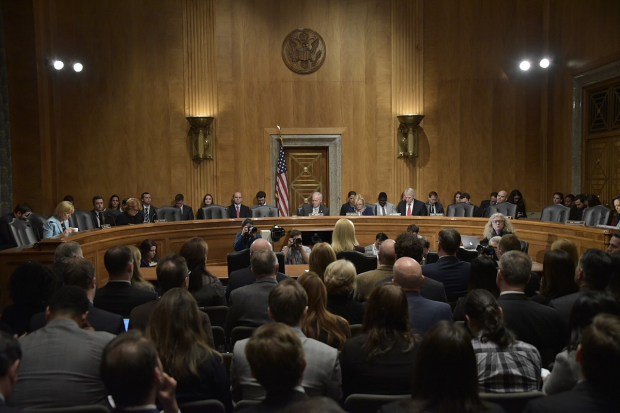3 University Leaders To Face Congressional Scrutiny on Antisemitism in Capitol Hill Hearing
By Joy LiwanagAs the issue of antisemitism continues to spark debates and tensions across college campuses nationwide, three university leaders find themselves thrust into the political spotlight. In a Capitol Hill hearing scheduled for May 23, the presidents of the University of California, Los Angeles (UCLA), the University of Michigan, and Yale University are slated to testify.
This marks the third such hearing in six months, underscoring the heightened scrutiny faced by institutions of higher education in addressing antisemitism and supporting Palestinian causes amid the Israel-Hamas conflict. As these leaders prepare to navigate the political crossfire, they face complex challenges with far-reaching implications for their institutions and the broader landscape of higher education.

(Photo : WIKIMEDIA COMMONS / U.S. Department of Homeland Security (DHS))
Antisemitism on Campus: A Growing Concern
In recent years, colleges and universities have grappled with incidents of antisemitism, exacerbating tensions within their communities. From offensive remarks and discriminatory actions to contentious debates surrounding Israel-Palestine relations, the issue has emerged as a pressing concern for campus leaders.
The rise of social media platforms has provided a platform for the dissemination of hateful rhetoric, further fueling tensions and polarization. In response, universities have implemented various initiatives to combat antisemitism, including educational programs, diversity training, and increased support for Jewish student organizations. However, the persistence of such incidents underscores the complexity of addressing deep-seated biases and prejudices within academic environments.
The Role of Congressional Hearings
Against this backdrop, Congressional hearings on campus antisemitism have taken center stage, shining a spotlight on university leaders and their responses to these challenges. Led by Republican members of the House Education and Workforce Committee, these hearings have sought to hold institutions accountable for their handling of antisemitic incidents and related protests.
While ostensibly aimed at addressing concerns about discrimination and campus safety, the hearings have also been criticized for their politicization and potential chilling effect on academic freedom. University presidents called to testify have faced intense scrutiny and pressure to demonstrate their commitment to combating antisemitism while upholding principles of free speech and intellectual inquiry.
Navigating Political Pressures
For university leaders, the prospect of testifying before Congress poses a delicate balancing act between appeasing lawmakers, protecting their institutions, and maintaining the trust of their campus communities. In the face of partisan rhetoric and polarizing debates, presidents must articulate their positions with clarity and conviction, while also acknowledging the complexities of the issues at hand.
Moreover, the political implications of their testimony extend beyond the confines of the hearing room, with potential ramifications for funding, enrollment, and institutional reputation. As they prepare to face Congressional scrutiny, university leaders must navigate a fraught political landscape while upholding their commitment to academic integrity and inclusivity.
Challenges and Controversies
Previous hearings have not been without controversy, as university presidents found themselves under fire for their handling of antisemitic incidents and related protests. Some critics have accused presidents of failing to adequately address concerns about discrimination and intolerance on their campuses, while others have questioned the motives behind the hearings themselves.
Moreover, the intersection of antisemitism with broader debates about Israel-Palestine relations has further complicated efforts to find common ground and foster constructive dialogue. As tensions escalate and emotions run high, university leaders face mounting pressure to strike a delicate balance between upholding free speech rights and ensuring a safe and inclusive campus environment.
Looking Ahead
As the date of the upcoming hearing approaches, university leaders find themselves at a critical juncture, grappling with complex challenges and competing priorities. While Congressional scrutiny may serve as a catalyst for action and accountability, it also raises questions about the politicization of higher education and the erosion of academic freedom.
Moving forward, it is essential for university leaders to remain steadfast in their commitment to combating antisemitism, promoting diversity and inclusion, and fostering a campus climate where all voices are heard and respected. By navigating the political crossfire with integrity and courage, they can help pave the way for meaningful dialogue, understanding, and reconciliation in the pursuit of a more just and inclusive society.
RELATED ARTICLE: Lawmakers Plan Extensive Crackdown On Campus Antisemitism, Threatening Funding








